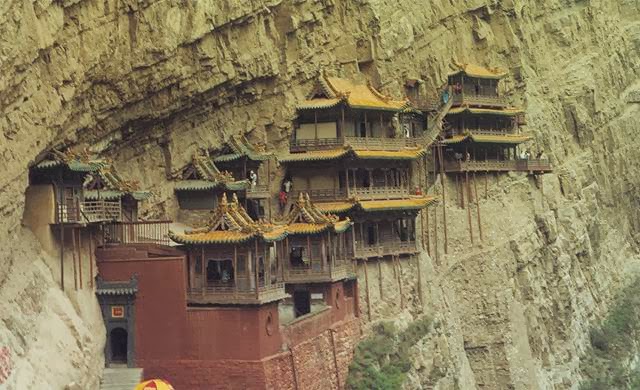Mountains has holds a great importance in China since ancient times. Chinese looks at mountains not as a holiday destination or a place to camp out in summer, but for their sacred significance.
These "sacred" mountains have been important destinations for Chinese for pilgrimage, infact the Chinese expression for pilgrimage (朝圣;cháoshèng) is a shortened version of an expression which means "paying respect to a holy mountain" .
Out of hundreds of such mountains, five are the most renowned mountains in Chinese History, it is called "Wuyue" or "Five Great Mountains".
The Five Great Mountains or Wu Yue are arranged according to the five cardinal directions of Chinese geomancy, which includes the center also as a direction.
A Han Dynasty tile emblematically representing the five cardinal directions.
These 5 mountains are -
1. East Great Mountain (Dōngyuè): Tài Shān (泰山, Shandong Province)
2. West Great Mountain (Xīyuè): Huá Shān (华山, Shaanxi Province)
3. South Great Mountain (Nányuè): Héng Shān (衡山,Húnán Province)
4. North Great Mountain (Běiyuè): Héng Shān (恒山,Shanxi Province)
5. Center Great Mountain (Zhōngyuè): Sōng Shān(嵩山, Hénán Province)
In Chinese Mythology, the Five Great Mountains originated from the body of Pangu
(盤古/盘古 Pángǔ), the first being and the creator of the world. Because of
its eastern location, Mount Tài is associated with the rising sun which
signifies birth and renewal. Due to this interpretation, it is often
regarded as the most sacred of the Five Great Mountains. In
accordance with its special position, Mount Tài is believed to have been
formed out of Pangu's head. Mount Heng in Hunan is believed to be a
remainder of Pangu's right arm, Mount Heng in Shanxi of his left arm,
Mount Song of his belly, and Mount Hua of his feet.[5]
1. Mount Tai (
泰山;
Tài Shān) is a mountain of historical and cultural significance located north of the city of Tai'an, in Shandong province, China.
It is associated with sunrise, birth, and renewal, and is often regarded the foremost of the five
Cultural References to Mount Tai -
1. (泰山北斗;
Tàishān Bĕidŏu) - As weighty as Mt Tai, as brilliant as the Big Dipper, a giant among men
2. 有眼不識泰山 (Yǒu yǎn bù shí tàishān) (literal translation Has eyes but doesn't recognize Mount Tai), refers to an ignorant yet arrogant person.
The Immortal Bridge (仙人桥; Xiānrén Qiáo),
泰山 南天门 (Tàishān nán tiānmén) (The South Gate to Heaven at Mount Tai)
Mount Tai is shown on the reverse side of the 5 yuan bill.
2. Mount Hua, or Hua Shan (华山;Huà Shān), or Xiyue (西岳;Xīyuè; literally "western great mountain") is a mountain located near the city of Huayin in Shaanxi province, about 120 kilometres (75 mi) east of Xi'an.
Hua Shan West Peak (Lianhua Feng (蓮花峰)
View from the North Peak
It is the steepest mountain to climb.
An example of how steep the paths are up Hua Shan
3. Mount Heng (衡山; Héng Shān), also known as Nan Yue (南岳; Nányuè), is located in Hunan Province, China.

At the foot of the mountain stands the largest temple in southern China, the Grand Temple of Mount Heng (Nanyue Damiao), which is the largest group of ancient buildings in Hunan Province.
衡山南岳大庙 (Héngshan nányuè dà miào)
4. Heng Shan or Heng Mountain (恒山;Héng Shān) in Shanxi Province.
Due to its northerly location, the mountain has made it impossible for
pilgrimages by the Chinese to take place for much of its history.
Because of this, Hengshan is not nearly as religiously important in
China as the other Taoist mountains.
Héng Shān
A temple in this area is the famous Hanging Temple,(悬空寺, Xuánkōng Sì) built more than 1,500 years ago into a cliff near the Mount.
Built more than 1,500 years ago, this temple is notable not only for its location on a sheer precipice but also because it is the only existing temple with the combination of three Chinese traditional religions: Buddhism, Taoism, and Confucianism.
The monastery is located in the small canyon basin, and the body of the
building hangs from the middle of the cliff under the prominent summit,
protecting the temple from rain erosion and sunlight. Coupled with the
repair of the dynasties, the color tattoo in the temple is relatively
well preserved. On December 2010, it was listed in the “Time” magazine
as the world's top ten most odd dangerous buildings.
The structure is kept in place with oak crossbeams fitted into holes chiseled into the cliffs. The main supportive structure was hidden inside the bedrock
Xuánkōng Sì in Night
Xuánkōng Sì in Daytime
The Chinese characters “壮观” (means grand sight or spectacular) at the foot of the mountain is the handwriting left by the great poet Li Bai in Tang Dynasty.
5. Mount Song (Mount Sung; 嵩山; Sōng Shān; literally "lofty mountain"), also known in Chinese as Song Shan, is a culturally significant mountain in China. It is the "Central Great Mountain" (中嶽/中岳) among the Five Great Mountains and located in Henan province on the south bank of the Yellow River
The mountain is one of the sacred Taoist
mountains of China, and contains important Taoist temples such as the
Zhongyue Temple; however the mountain also features a significant
Buddhist presence. It is home to the Shaolin Temple, traditionally considered the birthplace of Zen Buddhism, and the temple's collection of pagoda forest is the largest in China.
Shaolin Monastery or Shaolin Temple (少林寺, Shàolín Sì) is long famous for its association with Chinese martial arts and particularly with Shaolin Kung Fu, and it is the best known Mahayana Buddhist monastery to the Western world.
The shào (少) in "Shaolin" refers to Shaoshi Mountain (少室山), one of the seven mountains forming the Songshan mountain range;
It is on this mountain the Temple is situated. The word lín (林) means "forest". The word sì (寺) means "monastery/temple".
The taijiquan master Zhang Zuyao incorrectly translated "Shaolin" as "young (new) forest" or sometimes
"little forest". This newer translation is commonly accepted today.
少林寺碑林 (Shàolínsì bēilín)



.jpg)





.jpg)





















